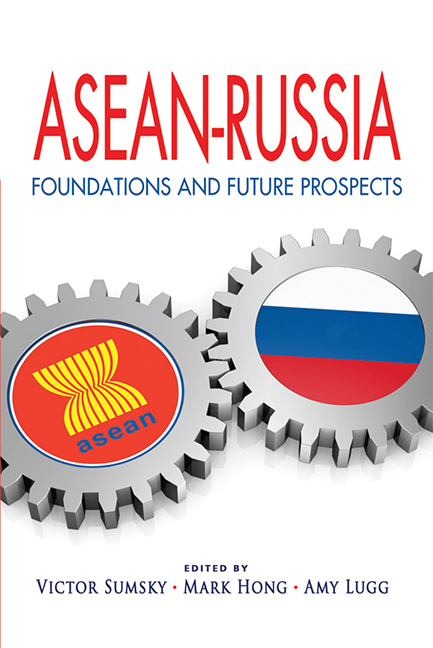Book contents
- Frontmatter
- Contents
- Foreword
- Preface
- About the Contributors
- Keynote Address
- Opening Remarks
- Keynote Address
- Introduction: Russia and the ASEAN Member States: Political and Economic Cooperation in Progress
- SECTION I WISEMEN'S VIEWS
- SECTION II GEOPOLITICS
- SECTION III BILATERAL RELATIONS
- SECTION IV Business and Economics
- Russia and ASEAN-4: Potential and Realms of Cooperation
- Russia's Economic Relations with the APEC Region
- Russia Looks East: Modernization Plans and Cooperation with ASEAN
- Indonesian and Russian Oilmen: Sharing Experiences and Learning from Each Other
- Towards a Roadmap for Russia-ASEAN Trade and Economic Cooperation
- The Best Cities to Buy Into
- SECTION V CULTURE AND EDUCATION
- EPILOGUE
- Index
Indonesian and Russian Oilmen: Sharing Experiences and Learning from Each Other
from SECTION IV - Business and Economics
Published online by Cambridge University Press: 21 October 2015
- Frontmatter
- Contents
- Foreword
- Preface
- About the Contributors
- Keynote Address
- Opening Remarks
- Keynote Address
- Introduction: Russia and the ASEAN Member States: Political and Economic Cooperation in Progress
- SECTION I WISEMEN'S VIEWS
- SECTION II GEOPOLITICS
- SECTION III BILATERAL RELATIONS
- SECTION IV Business and Economics
- Russia and ASEAN-4: Potential and Realms of Cooperation
- Russia's Economic Relations with the APEC Region
- Russia Looks East: Modernization Plans and Cooperation with ASEAN
- Indonesian and Russian Oilmen: Sharing Experiences and Learning from Each Other
- Towards a Roadmap for Russia-ASEAN Trade and Economic Cooperation
- The Best Cities to Buy Into
- SECTION V CULTURE AND EDUCATION
- EPILOGUE
- Index
Summary
INTRODUCTION
Since Russia is a top producer and exporter of hydrocarbons, it would be natural to dwell on what it might do in this capacity in Southeast Asia — specifically, in cooperation with Indonesia, Malaysia, the Philippines, Vietnam and Myanmar, where oil and gas resources of this region are mostly concentrated. The overlapping of the global crisis and the Fukushima nuclear disaster reminds us once again about the vital importance of energy security in all meanings of the term. Against this background, I wish to share some observations on the prospects of the Association of Southeast Asian Nations (ASEAN)-Russia cooperation in the oil and gas sector and on the lessons I have personally learned while doing business in the biggest oil-producing country of Southeast Asia.
Since late Soviet times, when the VietSovpetro joint venture was established and started to operate on the Vietnamese shelf, we have enjoyed an excellent partnership in oil and gas production with Vietnam. Even the Russian domestic turmoil of the 1990s did not affect our position there. Two years ago these relations were further strengthened and diversified by the establishment of another joint venture — Rus Vietpetro. Created by the Petro Vietnam and Zarubezhneft companies, it is designated to be the special purpose vehicle (SPV) of a major oil-producing project in the Northern part of Russia.
Furthermore, last year another Russian-based company, TNK-BP took over the BP shares in upstream and downstream assets in Vietnam. This kind of base, however, is not something we can rely on in any other ASEAN country. There, we practically have to start from scratch.
The companies that I am associated with have been looking for opportunities in Indonesia since 2006. These efforts have been successful enough to serve as a base for advice to other Russian colleagues. Close cooperation with Indonesian oilmen has taught me a number of practical and useful lessons, and I believe that my Indonesian counterparts have learned something too. Let me now list these lessons one by one.
- Type
- Chapter
- Information
- ASEAN-RussiaFoundations and Future Prospects, pp. 254 - 260Publisher: ISEAS–Yusof Ishak InstitutePrint publication year: 2012



